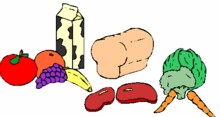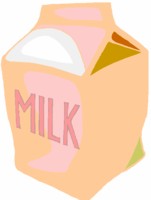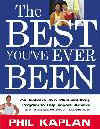Update
August 15, 2003
Healthy
Foods?
 Just
as people continue to ask whether infomercial products are
"good" or "bad," they perpetually want
to know if a given food is "good," or whether or
not it's "healthy." Just
as people continue to ask whether infomercial products are
"good" or "bad," they perpetually want
to know if a given food is "good," or whether or
not it's "healthy."
In the course of my
work with Personal Trainers, I find this "what food is
healthy" dilemma permeates many of the discussions trainers
have with their clients. Because trainers are not always credentialed
in nutrition, this brings them into a gray area, and to complicate
matters further, trainers, as most Americans, are often confused
as to the fine points of truly supportive eating. The clients
often have their preconceived notions, and while the trainers
want to offer direction, the firm commitments to those notions
raise continued question marks.
In attempting to minimize
the questions, let's eavesdrop on an exaggerated conversation
between a personal fitness trainer and his client as they
veer off into a nutritional discussion:
Trainer: "In reviewing
your nutrition journal, I notice for breakfast you're eating
oat cereal and drinking orange juice. Why?"
 Client:
"I'm eating it because it's healthy." Client:
"I'm eating it because it's healthy."
Trainer: "And I also
notice there isn't any fish in your nutrition program. Why
is that?"
Client: "Because
fish is unhealthy."
Trainer: "Why are
you having peanuts as a daily snack?
Client: "Because
peanuts are healthy"
Trainer: "And why
are you having red wine every night with a piece of chocolate?"
Client: "Stop asking
stupid questions. It's healthy!!!!"
In the real world,
with just a hint of researching skill, the client can find
literature to back up every one of his statements.
Before writing this,
I showed the above dialogue to 20 people and asked whether
the client was correct. I couldn't find any pattern of agreement
or disagreement. Some said the client was 100% right, others
said he (she) was way off base. Some agreed with the idea
of oat cereal being healthy, but took issue with the idea
of chocolate being healthy. This little experiment of mine
reinforced what I already knew. People are confused.
I'm going to make
a statement that may surprise, even shock you. No
food is healthy!
I'll go even further.
No food is unhealthy, at least, not in and of itself.
 Food,
if we are referring to a mix of nutrients suitable for human
consumption, is nutritious. If you're low on fuel, a handful
of gummi bears can provide a short term glucose driven energy
supply. If you're close to famished, a McDonalds Happy Meal
can provide vital nutrients for survival. The idea of a specific
food, in and of itself being healthy, is in my opinion a combination
of old wives tales and marketing driven by food sellers. Food,
if we are referring to a mix of nutrients suitable for human
consumption, is nutritious. If you're low on fuel, a handful
of gummi bears can provide a short term glucose driven energy
supply. If you're close to famished, a McDonalds Happy Meal
can provide vital nutrients for survival. The idea of a specific
food, in and of itself being healthy, is in my opinion a combination
of old wives tales and marketing driven by food sellers.
What's
up with Soy?
Is soy healthy?
Sure, if you read the literature put out by the Soy Protein
Council. They have a mission. The Council's primary purpose
is "to promote the growth and interests of the soy protein
industry and broaden the acceptance of soy products as key
components of the worldwide food system." Of course the
Soyfoods Association of North America would agree. If you
attend their annual symposium you'll leave ready to make soy
the mainstay of your diet. Way back when soy wasn't given
much attention at all, at least not as a source of quality
nutrition. It found it's place as a "meat extender."
Today natural markets have trouble keeping everything from
soy burgers to Tofutti, a soy based ice cream alternative,
on their shelves. You can find research to support the idea
that soy lowers "the bad cholesterol," that it prevents
cancer, and that it offsets the risk of coronary artery disease.
Articles in health magazines will introduce words such as
"phytoestrogens" and "isoflavones" which
are "proven" contributors to health.
 Here's
what's happening. Marketers of products, soy farmers, and
those who stand to prosper by the ever-growing popularity
of soy are cleverly exploiting the health virtues of components
of a food, but if we fail to look at a food as a piece in
a synergistic puzzle, and if we fail to recognize that just
as we can extract nutritional elements that may be virtuous,
we can find potentially dangerous elements, we are being short
sighted. There are those who stand to prosper by making "good
fats" the hero of the decade, and many of these organizations
have identified the "dangers" of soy. They'll refer
to a 1985 study titled "The USDA trypsin inhibitor study,"
and point out that the soybean contains toxins, some of which
inhibit enzymes need for protein digestion. Extrapolating
upon this "research information" they'll point out
that the ingestion of such toxins can lead to issues such
as gastric distress, amino acid deficiency disorders, and
cancer. They'll also point out that soy contains haemagglutinin
which can inhibit oxygen uptake and growth. Phytic acid is
another element present in the soybean, and guess what it
does. It blocks the transport and hinders the absorption of
minerals. Can this be proven? Sure. We can turn to research
studies conducted on tribal populations in various parts of
the world and draw correlations between phytic acid intake
and disease. We can turn to research on animals to show that
soy intake causes increased incidence of thyroid cancer in
rats. There is in fact so much research, and so many meta-analyses,
we can pick and choose the information we want to use to support
whatever side we opt to lean on. Here's
what's happening. Marketers of products, soy farmers, and
those who stand to prosper by the ever-growing popularity
of soy are cleverly exploiting the health virtues of components
of a food, but if we fail to look at a food as a piece in
a synergistic puzzle, and if we fail to recognize that just
as we can extract nutritional elements that may be virtuous,
we can find potentially dangerous elements, we are being short
sighted. There are those who stand to prosper by making "good
fats" the hero of the decade, and many of these organizations
have identified the "dangers" of soy. They'll refer
to a 1985 study titled "The USDA trypsin inhibitor study,"
and point out that the soybean contains toxins, some of which
inhibit enzymes need for protein digestion. Extrapolating
upon this "research information" they'll point out
that the ingestion of such toxins can lead to issues such
as gastric distress, amino acid deficiency disorders, and
cancer. They'll also point out that soy contains haemagglutinin
which can inhibit oxygen uptake and growth. Phytic acid is
another element present in the soybean, and guess what it
does. It blocks the transport and hinders the absorption of
minerals. Can this be proven? Sure. We can turn to research
studies conducted on tribal populations in various parts of
the world and draw correlations between phytic acid intake
and disease. We can turn to research on animals to show that
soy intake causes increased incidence of thyroid cancer in
rats. There is in fact so much research, and so many meta-analyses,
we can pick and choose the information we want to use to support
whatever side we opt to lean on.
So is soy good? Well,
sure. Is it bad? Umm. Yup. Does it have its place as a component
of a supportive nutrition program? Absolutely. Is it, in and
of itself, the great nutritional health salvation to cure
all that ails us? I think you know the answer.
Got
Milk?
 Is
dairy healthy? Well, whole milk gets 49% of its calories
from fat. Hmm, so that's not healthy, is it? Well, let's see
. . . some of the diet gurus say fat is good. Maybe it is
healthy. It contains calcium, doesn't it? And we need calcium.
In fact, some of the hot new calcium products claim calcium
deficiency is responsible for every disease known to mankind.
But wait a minute. Doesn't milk contain hormones, and toxins,
and Bovine Growth Hormone? Aren't those milk producing cows
injected with antibiotics that result in the growth of drug
resistance bacteria? Doesn't milk have lactose and aren't
many Americans lactose intolerant? Then again, milk is a valuable
source of biologically available proteins. We need protein
for tissue maintenance and growth. Oh, wait . . . but it causes
mucus which clogs up your lungs and sinus cavities much like
the gunk that plumbers have to remove from clogged drains. Is
dairy healthy? Well, whole milk gets 49% of its calories
from fat. Hmm, so that's not healthy, is it? Well, let's see
. . . some of the diet gurus say fat is good. Maybe it is
healthy. It contains calcium, doesn't it? And we need calcium.
In fact, some of the hot new calcium products claim calcium
deficiency is responsible for every disease known to mankind.
But wait a minute. Doesn't milk contain hormones, and toxins,
and Bovine Growth Hormone? Aren't those milk producing cows
injected with antibiotics that result in the growth of drug
resistance bacteria? Doesn't milk have lactose and aren't
many Americans lactose intolerant? Then again, milk is a valuable
source of biologically available proteins. We need protein
for tissue maintenance and growth. Oh, wait . . . but it causes
mucus which clogs up your lungs and sinus cavities much like
the gunk that plumbers have to remove from clogged drains.
So
how do we make healthy food choices?
If you're looking
for a resolution of the "good or bad" issue, you
won't find it in this article. I don't believe you'll find
it at all. Anywhere. The point is, healthy nutrition
is a regimen that allows you to function at your best, to
maintain optimal metabolic function, to sleep well at night,
to have consistent energy, and to keep your immune system,
your skeletal system, and your cardiorespiratory system functioning
at optimal capacity. Specific foods aren't healthy or unhealthy,
but habits can be. I've been encouraging people to eat sensibly,
to make the most natural food choices possible, to avoid simple
sugars and refined and processed grains, and to get a mix
of proteins, complex carbs, fiber, and essential fat. In attempting
to make this simple, I've been encouraging people to consume
a lean protein, starchy carb, and fibrous carb every time
they eat and to attempt to make their selections from a wide
variety of foods. I've been encouraging people to drink water,
lots of water, and of course, I've been encouraging people
to integrate both aerobic exercise and resistance exercise
into their lives so the body is best equipped to utilize the
ingested nutrients for processes that lead to health and well
being. Unless you have specific food sensitivities, I assure
you, you can be healthy with or without soy, with or without
dairy, and with or without meat. You just have to find a manner
of consuming those nutrients you require to keep the human
machine functioning at its best and with the guidelines I've
laid out, I believe most "experts" would agree you're
"eating right."
Let's
go back to the foods I mentioned in the trainer:client conversation
at the beginning of this article:
 Oats.
Good or bad? We know they're good. How do we know? Well
. . . let's see . . . the Cheerios commercials tell us they're
good. The Quaker Oats product marketing tells us oats can
lower cholesterol and reduce the risk of heart disease. That
started around 1986, when a study, that was in part funded
by Quaker Oats, was published in the Journal of the American
Dietetic Association. That study prompted Quaker to advertise
that research had proven a 10% reduction in cholesterol. What
they failed to make evident was that the study initially put
just over two hundred subjects on the American Heart Association
modified fat diet and found the fat modification resulted
in a 7% drop in cholesterol. At that point oat bran was added
to the modified fat diet and the cholesterol continued to
drop another 3%. Was it the result of the oats? Who knows,
but Quaker was quick to run with it and shortly thereafter
oat bran was being added to just about everything containing
grains. Oat bran muffins, oat bran breads, and oat bran cereals
were all jumping on the "reduce cholesterol" bandwagon.
In 1990 a Harvard study by Sacks and Swain showed that oat
bran had no effect upon cholesterol. Still, today, people
are buying oat bran cereal believing they are taking a step
toward health. Is it bad for you? No, but will a bowl of cereal
in the morning have a dramatically positive impact upon your
health, fitness, and well being? Not likely. If you're concerned
with body composition, and have more fat on your body than
you'd like, is a bowl of oatmeal and orange juice ideal? far
from it. The release of glucose into the bloodstream is certain
to impact insulin levels and create a hormonal environment
that is not conducive to fat release. Oats.
Good or bad? We know they're good. How do we know? Well
. . . let's see . . . the Cheerios commercials tell us they're
good. The Quaker Oats product marketing tells us oats can
lower cholesterol and reduce the risk of heart disease. That
started around 1986, when a study, that was in part funded
by Quaker Oats, was published in the Journal of the American
Dietetic Association. That study prompted Quaker to advertise
that research had proven a 10% reduction in cholesterol. What
they failed to make evident was that the study initially put
just over two hundred subjects on the American Heart Association
modified fat diet and found the fat modification resulted
in a 7% drop in cholesterol. At that point oat bran was added
to the modified fat diet and the cholesterol continued to
drop another 3%. Was it the result of the oats? Who knows,
but Quaker was quick to run with it and shortly thereafter
oat bran was being added to just about everything containing
grains. Oat bran muffins, oat bran breads, and oat bran cereals
were all jumping on the "reduce cholesterol" bandwagon.
In 1990 a Harvard study by Sacks and Swain showed that oat
bran had no effect upon cholesterol. Still, today, people
are buying oat bran cereal believing they are taking a step
toward health. Is it bad for you? No, but will a bowl of cereal
in the morning have a dramatically positive impact upon your
health, fitness, and well being? Not likely. If you're concerned
with body composition, and have more fat on your body than
you'd like, is a bowl of oatmeal and orange juice ideal? far
from it. The release of glucose into the bloodstream is certain
to impact insulin levels and create a hormonal environment
that is not conducive to fat release.
 Is
fish "healthy?" Well, fish is typically low
in fat, contains an abundance of protein and is rich in the
much praised Omega 3 essential fatty acids. You can also read
articles scaring you away from ever consuming fish as they'll
lay out the hazards of mercury toxicity. Is fish good? Yup.
Can fish be bad? Uh-huh. So is there room for fish in a supportive
eating program? I believe there's lots of room, assuming again,
it is a part of an overall program and that seafood choices
come from a variety of sources. Is
fish "healthy?" Well, fish is typically low
in fat, contains an abundance of protein and is rich in the
much praised Omega 3 essential fatty acids. You can also read
articles scaring you away from ever consuming fish as they'll
lay out the hazards of mercury toxicity. Is fish good? Yup.
Can fish be bad? Uh-huh. So is there room for fish in a supportive
eating program? I believe there's lots of room, assuming again,
it is a part of an overall program and that seafood choices
come from a variety of sources.
 Is
there room for peanuts in a nutrition program? Sure. Peanuts
have valuable essential fats and can be a source of protein.
Does that mean they're healthy? Well, too much saturated fat
can lead to fat accumulation and peanuts are relatively high
in saturated fats. So are they "good?" Well, sure,
as long as they're integrated into an overall program of supportive
nutrition. Is
there room for peanuts in a nutrition program? Sure. Peanuts
have valuable essential fats and can be a source of protein.
Does that mean they're healthy? Well, too much saturated fat
can lead to fat accumulation and peanuts are relatively high
in saturated fats. So are they "good?" Well, sure,
as long as they're integrated into an overall program of supportive
nutrition.
Red wine? Is
it good? Well ask any wine connoisseur and of course you'll
get an affirmative response. Ask a sports nutritionist and
the response will likely go in the other direction. Yes, wine
does contain polyphenols which can keep the arteries clear,
and yes, the grapes do contain bioflavanoids, which are antioxidants
and can ward of cancer. It also contains sulfites, histamine,
and tannin, which have been indicted in causing headaches.
It also contains alcohol which is the simplest sugar there
is. Alcohol contains 7 calories per gram (other sugars contain
only four) and has next to no nutritional value. Alcohol can
affect insulin levels, can hinder fat release, can lead to
food cravings, and we won't even discuss impairment or addiction
potential. So, good, or bad? Both . . . or neither. Can you
enjoy a glass of wine every now and then and maintain a healthy
regimen? Of course. Is it the drink of champions? Well, while
Gatorade also has its shortcomings, I don't think the NFL
is about to trade it for red wine. At least, not on the field.
And finally, chocolate!
If you want to believe chocolate is good, you'll pay attention
to the fact that chocolate rich in flavanoids delivers tiny
little nutrients that can play a tiny little role in offsetting
risk of heart disease and stroke. If you want to be a little
more balanced in your approach to supportive eating, you'll
recognize that the most publicized studies evidencing the
virtues of chocolate were funded by Mars, Inc., the manufacturer
of Snickers, Milky Way, and Twixt. Can you eat chocolate and
be fit, lean, and healthy? Sure, but the best advice I can
offer here is save it for the cheat day.
Allow
me to list, in review, the hints I offered for supportive
eating.
- Consume a lean protein, starchy
carb, and fibrous carb every time you eat
- Be certain to get adequate intake
of essential fatty acids
- Attempt to make your selections
from a wide variety of foods
- Drink water, lots of water,
all day long
- Make the most natural food choices
possible
- Avoid simple sugars and refined
and processed grains
- Integrate both aerobic exercise
and resistance exercise into your life
Simple? Sure it is.
From this point forward, when someone asks me whether a specific
food is "good" or "bad," I'm directing
them right here, to this article!
If you want more info
on supportive eating, look into my programs
or consider my book, EAT! Supportive
Nutrition For the Body You Love.
Here
are a few other related articles (previous updates listed
below):
If Fat Loss is
a goal . . .
.
. . check out the following article and consider the new
e-book,
Ultimate Fat Loss:
Personal Trainers
. . .
. . . if you don't yet have your
copy, order Fired
Up!, Phil's new e-book for adjusting the trainer
mindset to the setting for success!
If
you want the program that shares it all . . . get The Best
You've Ever Been!!
 The
testimonials keep coming. The
testimonials keep coming.
"It's been the most unbelievable
8 weeks of my life. I've always worked out, always thought
I'd always eaten right, and just thought that after the age
of 40 I'd have to settle for the body I was in. I realize
now it took just a few little changes in my nutrition and
a complete overhaul of my exercise program to get me back
into a body that looks great, even without clothes, and as
you say, "performs" at its peak, and my wife agrees!"
- Terry Mattson, Houston, TX
Phil's Radio Show
. . . Anytime!
Previous Updates:
Update
7/7/03 - Bars and Meal Replacements . . . What's Best?
Update
6/9/03 - The Ab-solute Truth
Update
4/20/03 - The Great Diet Debate & Atkins Revisited
Update
3/22/03 - I Know What I Should Eat, But . . .
Update
3/6/03 - Deceptive Food Labels
Update
2/4/03 - The Relationship Between Sex and Fitness
Update
1/25/03 - Phil's Biggest Mistake - The EAT! Formula Screw
Up
Update
1/12/03 - The Talk Show Illusion (Infomercials exposed)
Update
12/14/02 - Penis Enlargers and Breast Enhancing Pills
Update
11/20/02 - How Do I Lose This?
Update
8/27/02 - The Promise and the Real Story Behind the Infomercials
Update 8/01/02 - Clearing
up Four Prevalent Myths
Update
6/20/02 - Giving Credit Where Credit is Due
Update 5/11/02 - Miracle
GH, What "Works"
Update 3/25/02 - Women on
Steroids and More on Core Training
Update
2/15/02 - the Good, the Bad, and the Ugly of Fitness
Update
1/14/02 - Counting Calories
Update
12/28 - 'Twas the Night Before New Years
Update
12/8 - The New Electronic Ab Offerings
Update
12/12 - The "Magic" is Within You
Update 11/20 - Holiday
eating!
Update
11/3 - Weight Loss Bread and other Nonsense!
Update 10/29 - Supplement
Values
Update
10/3 - Getting Back to Doing What We Do
Update 9/19 - Tragedy and
Love, RE: Sept 11
Update 8/15 - Myths, Fallacies,
False Beliefs
Update 8/1 - The Internet,
Leptin, Steroids, and more
Update
7/9 - The New Supplements
Update 6/14 - Seminar
offerings and clarity on "Brownies"
Update 5/29 - Lose
Weight, Eat Brownies?!?!?
Update 5/1/01 - Pizza, Beer, and Fitness
Update 4/7/01 - "Phil-osophies"
and Rip-Off Realities!
Update 4/1/01 - Gourmet Recipes!
Update 3/15/01 - Research Has
Proven?
Update 3/1/01 - Preparing for
The New Infomercial
Update 2/1/01 - Time, Space,
Matter, and Energy
Update 1/15/01 - Atkins hits
the UK
Update 10/7/00 - Supplements,
Additional Clarity
Update 7/27/00 - The Experts
Round Table, Almada, Colgan, Parillo
Update 7/3/00 - Core Training
& Metabolism Boosters
[
Fitness Superstore ]
[ Site MENU ] [ Seminars
]
[
Home ] [ Site
Menu ] [ For Fitness Professionals
] [ Superstore ] [ Update
Menu ] [ Ask
Phil
]
[ Small
Group Workshops ] [ Programs
]
This
site is designed and operated by Phil Kaplan
Phil Kaplan's Fitness is located at
3132 Fortune Way, #D1
Wellington, Florida 33414
The TOLL-FREE Product Order Line is 1 800 552-1998
The Direct Office Number is 561 204-2014
The Fax Number is 561 204-2184
e-mail phil@philkaplan.com

|

